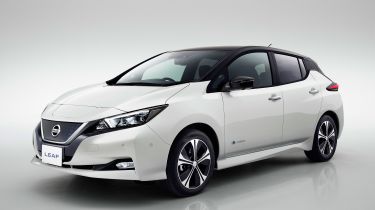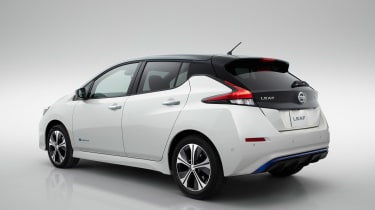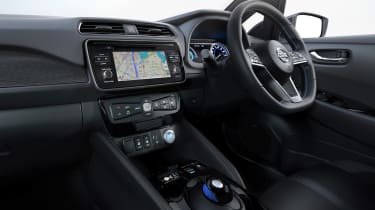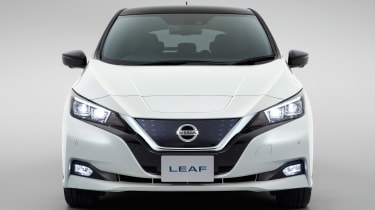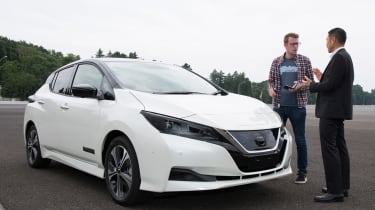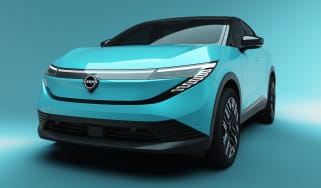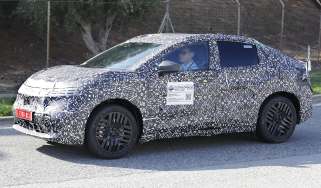New 2018 Nissan Leaf goes on sale from £21,990
The new Mk2 Nissan Leaf electric car has a range of 235 miles - with a 310-mile model to follow - and advanced autonomous systems
Nissan’s all-new Leaf electric hatchback goes on sale in the UK from February 2018 with prices starting at £21,990, if you include the Government’s £4,500 plug-in car grant.
In addition to the standard Nissan Leaf range, a special launch edition called 2.ZERO costs £26,490 and sits below the range-topping Tekna trim (£27,490). The Leaf 2.ZERO comes equipped with ProPilot autonomous driving technology, 17-inch wheels, front and rear heated seats, as well as a seven-inch infotainment screen with Apple CarPlay and Android Auto compatibility.
The launch edition Leaf, of which 1,500 examples will be built, is also on offer on a PCP contract for £339 per month on a three-year/10,000-mile deal with a £5,138 customer deposit and £1,000 dealer contribution.
The second-gen Leaf has been developed under Nissan's Intelligent Mobility programme which has three pillars; Intelligent Power, Intelligent Driving and Intelligent Integration.
First up is Intelligent Driving. By far the biggest advance for the Leaf comes in the form of Nissan’s e-Pedal. This switchable system increases the regenerative braking when you lift off the accelerator to 0.2g, or around four times more than regular engine braking in a petrol or diesel car. It means you can deal with 90 per cent of driving using just the accelerator, Nissan claims.
Nissan’s ProPilot autonomous system is also part of the Intelligent Driving technology fitted to the car, the Leaf being the first Nissan sold in Europe to feature the technology as standard. ProPilot controls the Leaf’s steering, braking and engine to assist the driver. It works on motorways, taking the strain off the driver in queuing traffic at speeds of up to 62mph. ProPilot Park is also included, using a new set-up making its debut on the Leaf. The car can manoeuvre itself into pretty much any space using its combination of 12 sonar sensors and four cameras.
Nissan’s second pillar of innovation – called Intelligent Power – covers the car’s battery pack and electric motor. As with its predecessor, the new Leaf will be offered with a choice of two battery packs.
The standard version uses a new 40kWh lithium-ion battery, up from the 30kWh of the outgoing model. The front-mounted motor produces 110kW, or 148bhp, up from the outgoing car’s 108bhp, resulting in a 0-62mph sprint in around 9.8 seconds. A new power-management processor in the new car is twice as fast as that in the old one, meaning even sharper response to the accelerator pedal. Add in the more powerful motor and the direct cooling for the inverter, and it means the new Leaf is a full 30 per cent faster from 37 to 62mph.
• Nissan's Sunderland success story: UK car manufacturing at its best
The battery pack is the same physical size as the unit in the original Leaf but is denser, improving range to 235 miles on a single charge. That’s over 50 per cent further than the current car can officially go, but the recharging time remains the same, at around 40 minutes for an 80 per cent fast charge. This battery will take around eight hours for a full top-up from a normal 6kW charger.
There will be a higher-capacity battery available in a more powerful variant, too. Nissan tells us this will be offered a year to 18 months after the new Leaf’s launch, and that it will give the car a range of more than 310 miles when it arrives.
For the first time, this higher-capacity, physically larger battery will also be teamed with a more powerful electric motor, although Nissan has yet to reveal exactly how much extra power this version will have over the standard car.
To improve efficiency, the body has been redesigned with a flat floor, sharper nose and more aggressively tapered rear. Nissan’s trademark V-motion grille, boomerang lights and kicked-up rear shoulder line mean it also looks more conventional, to appeal to more buyers.
The new form has a drag coefficient of 0.27, making it quieter on the move. Nissan claims it’s nearly as refined as some executive saloons such as the BMW 5 Series and Mercedes E-Class. It’s more practical, too, because boot space increases from 370 litres to 435 litres.
• Best electric cars on sale right now
Nissan’s final pillar of innovation is Intelligent Integration in the Leaf. With the new car, Nissan is pushing the connected aspects of the car, and while this means new vehicle-to-home facilities to help distribute electricity back to the grid when it’s needed, the bigger benefit to most owners will be the connectivity inside.
Q&A with Hiroki Isobe
Chief vehicle engineer, Nissan Leaf
We sat down with the man behind Nissan’s second-generation Leaf to discuss the brand’s aims for the car.
Q: What does the new Leaf have to achieve for Nissan?
A: “This car has to move EVs from early adopters into the mainstream and we’re doing that by making this a more emotional, more enjoyable car to drive.”
Q: How do you inject emotion into a car where one of the biggest elements you have a connection with has been removed?
A: “We wanted to make the new Leaf more fun and the emotion comes from the one-pedal driving and the even quicker responses from the powertrain. I think this one-pedal operation is a kind of evolution – from manual to automatic to this. The low centre of gravity helps handling, too, while the e-plus model will boost this.”
Q: How different is the battery in the e-plus model?
A: “It’s larger than the standard battery and the cells and structure are also different. It means the e-plus will be lower and have less ground clearance.”
Q: Can we expect wireless charging on the new Leaf?
A: “The car hasn’t been prepared for wireless charging because this would require optimisation on the infrastructure and vehicle side. It’s difficult to say when this will be viable on the Leaf.”
What do you think of the new Nissan Leaf? Let us know in the comments section below...
Find a car with the experts

